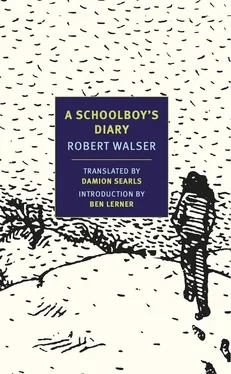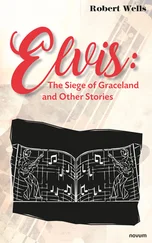Robert Walser - A Schoolboy's Diary and Other Stories
Здесь есть возможность читать онлайн «Robert Walser - A Schoolboy's Diary and Other Stories» весь текст электронной книги совершенно бесплатно (целиком полную версию без сокращений). В некоторых случаях можно слушать аудио, скачать через торрент в формате fb2 и присутствует краткое содержание. Город: New York, Год выпуска: 2013, ISBN: 2013, Издательство: NYRB Classics, Жанр: Классическая проза, на английском языке. Описание произведения, (предисловие) а так же отзывы посетителей доступны на портале библиотеки ЛибКат.
- Название:A Schoolboy's Diary and Other Stories
- Автор:
- Издательство:NYRB Classics
- Жанр:
- Год:2013
- Город:New York
- ISBN:978-1590176726
- Рейтинг книги:5 / 5. Голосов: 1
-
Избранное:Добавить в избранное
- Отзывы:
-
Ваша оценка:
- 100
- 1
- 2
- 3
- 4
- 5
A Schoolboy's Diary and Other Stories: краткое содержание, описание и аннотация
Предлагаем к чтению аннотацию, описание, краткое содержание или предисловие (зависит от того, что написал сам автор книги «A Schoolboy's Diary and Other Stories»). Если вы не нашли необходимую информацию о книге — напишите в комментариях, мы постараемся отыскать её.
A Schoolboy's Diary and Other Stories — читать онлайн бесплатно полную книгу (весь текст) целиком
Ниже представлен текст книги, разбитый по страницам. Система сохранения места последней прочитанной страницы, позволяет с удобством читать онлайн бесплатно книгу «A Schoolboy's Diary and Other Stories», без необходимости каждый раз заново искать на чём Вы остановились. Поставьте закладку, и сможете в любой момент перейти на страницу, на которой закончили чтение.
Интервал:
Закладка:
Robert Walser
A Schoolboy's Diary and Other Stories
INTRODUCTION
“SECRETLY, I love art,” declares the young Fritz Kocher in one of his school essays. “But it’s not a secret anymore… because now I’ve been careless and blabbed it. Let me be punished for that and made an example of.” Robert Walser’s narrators are always praising obedience and punishment: “I want to be industrious and obey whoever deserves to be obeyed”; “A firm command and silent obedience — that would really be much better”; “Anything forced on me, whose necessity has been mutely insisted upon from every side, I try to approach obligingly, and like it”; “We are cowards; we deserve an Inquisitor to discipline us”; and so on. At the same time, however, Walser’s narrators — especially his schoolboys, and there is something of the schoolboy in all of his narrators — are possessed by a levity that borders on giddiness. Walser’s writing has an energy that exceeds or undercuts or otherwise complicates its own demand to be disciplined.
The associational flights of Fritz’s class assignments escape the teacher’s authority even as they appeal to it:
Colors fill up your mind too much with all sorts of muddled stuff. Colors are too sweet a muddle, nothing more. I love things in one color, monotonous things. Snow is such a monotonous song. Why shouldn’t a color be able to make the same impression as singing? White is like a murmuring, whispering, praying. Fiery colors, like for instance Autumn colors, are a shriek. Green in midsummer is a many-voiced song with all the highest notes. Is that true? I don’t know if that’s right. Well, the teacher will surely be so kind as to correct it.
No teacher is in a position to say whether midsummer green is a many-voiced song, at least not without assuming a position of absurd literality, and so Fritz’s evocation of the teacher’s corrective power is a way of revealing its limits. Still, it would be wrong to say this passage only mocks or ironizes submissiveness. There is the typically Walserian statement: “I love things in one color, monotonous things.” Praise for the monotonous, the uniform, the mundane, the insignificant — such sentiments are everywhere in Walser’s work and maintain a crucial ambiguity. On the one hand they are expressions of poetic attunement to those aspects of the world we too readily overlook, and for which writers concerned with heroic exploits often have no time. On the other hand, Walser’s celebration of the monotonous or uniform returns us to his fascination with subservience, with relinquishing all personality to imposed order: “Modestly stepping aside can never be recommended as a continual practice in strong enough terms.” The force of Walser’s writing derives from this simultaneous valorization of irreducible individuality and of sameness, smallness, interchangeability. In the most various terms, Walser praises monotony; it makes it wonderfully difficult to read his tone. When is he serious? When is he mocking the will to conformity? Susan Sontag has written that “The moral core of Walser’s art is the refusal of power; of domination.” And yet, paradoxically, part of the power of Walser’s art lies in how that refusal of domination interacts with his narrators’ demands to be dominated. Walser’s voice is a strange mix of exuberance and submission, lyrical abandon and self-abnegation. His refusals are antiheroic, wavering; they reveal — sometimes comically, sometimes tragically — how the desire to be ruled enters the subject, the son, the servant, the pupil.
How can a writer refuse even the power of refusal, preserve his freedom while falling all over himself to give it away? Maybe the answer has to do with how Walser’s singular sentences themselves “step aside”: one of the most notable effects of his prose is how it seems to evaporate as you read. Walter Benjamin said of Walser’s “garlands of language” that “each sentence has the sole purpose of rendering the previous one forgotten.” This is not to say there aren’t depths of meaning and memorable passages, but Walser’s genius often involves a kind of disappearing act. W. G. Sebald has remarked that Walser’s writing “has the tendency to dissolve upon reading, so that only a few hours later one can barely remember the ephemeral figures, events and things of which it spoke… Everything written in these incomparable books has — as their author might himself have said — a tendency to vanish into thin air.” The content of Walser’s sentences can vanish, I think, because Walser is often less concerned with recording the finished thought than with capturing the movement of a mind in the act of thinking; it’s the motion that stays with you, not a stable set of meanings.
Perhaps this is why Walser was drawn to the conceit of schoolroom essays for his first book: Kocher is always worrying about managing his time, or running out of it, or having to force himself to write in the absence of an idea, allowing Walser to emphasize the present tense of composition. But even outside the schoolroom, Walser’s other narrators frequently break off, interrupt themselves, or explode the fictional frame altogether: “In the bright, hot midday sun I would stop for a moment to rest under a fir, beech, or oak tree, stretching out on the moss or grass… But where am I? Am I actually on a hike right now? How is that possible?” Walser’s digressive immediacy is as important as what his words denote. “The present time, surrounding you, singing and making noise, cannot,” Fritz claims, “be put down in writing in any satisfactory way”—and yet that’s precisely what Walser repeatedly accomplishes, registering the rhythms of the present in the action of his sentences. Fritz again: “It is as though you could hear Thought itself softly whispering, softly stirring. It’s like the scurrying of little white mice.” Walser’s sentences might declare the need for obedience, order, subservience, but those declarations are dissolved in the agitations of his syntax. If it’s true, as Fritz says, that “Style is a sense of order,” then we could say that a style that evaporates is a method of escape. The meanings of Walser’s meandering sentences scurry away — right under the nose of the teacher or Inquisitor. The schoolchild is at that critical juncture where indoctrination intensifies, where pedagogy shades into penality, but the child nevertheless possesses unconquered territories of freedom and feeling whose topography Walser’s sentences describe so beautifully even as they disappear.
It is often remarked that, although he wrote his greatest novels in the period leading up to the First World War, Walser’s writing says very little about the disasters of his time. Nonetheless I find it impossible to separate the interplay of independence and conformity in Walser’s work from the surpassing catastrophes of the twentieth century. (The last piece in this volume—“Hans”—was published in 1920, just four years before the world was introduced to Hans Castorp in Thomas Mann’s The Magic Mountain . At the end of Walser’s story and Mann’s novel, the two mercurial Hanses enlist.) In the short piece “In the Military”—Walser served in the Swiss National Guard — we again encounter a struggle between the values of refusal and obedience. “I am certainly a proponent of the slackard’s life, laziness, happiness, and peace; but alas,” writes the confused narrator, “I am also for the military. I think peace is nice and I think the military is nice.” The military is nice, he explains, because it frees you from the obligation to think, and yet to “imagine a million-strong crowd of… individuals who dispense with the thinking of any halfway or entirely reasonable thoughts.
Читать дальшеИнтервал:
Закладка:
Похожие книги на «A Schoolboy's Diary and Other Stories»
Представляем Вашему вниманию похожие книги на «A Schoolboy's Diary and Other Stories» списком для выбора. Мы отобрали схожую по названию и смыслу литературу в надежде предоставить читателям больше вариантов отыскать новые, интересные, ещё непрочитанные произведения.
Обсуждение, отзывы о книге «A Schoolboy's Diary and Other Stories» и просто собственные мнения читателей. Оставьте ваши комментарии, напишите, что Вы думаете о произведении, его смысле или главных героях. Укажите что конкретно понравилось, а что нет, и почему Вы так считаете.











